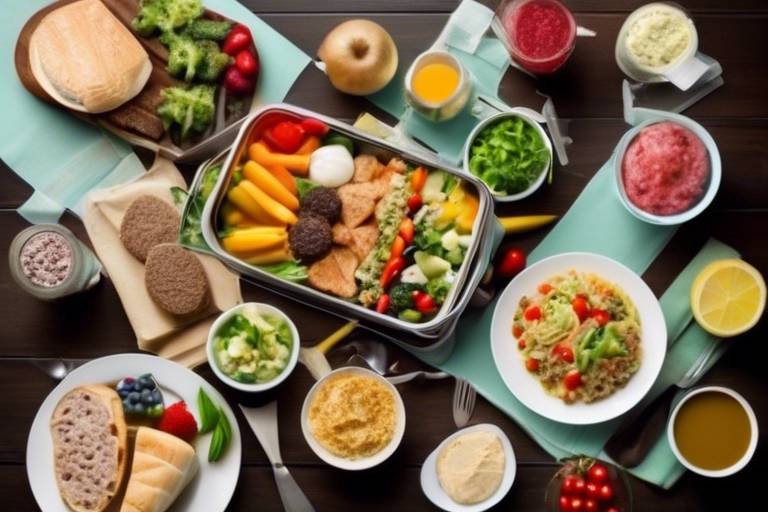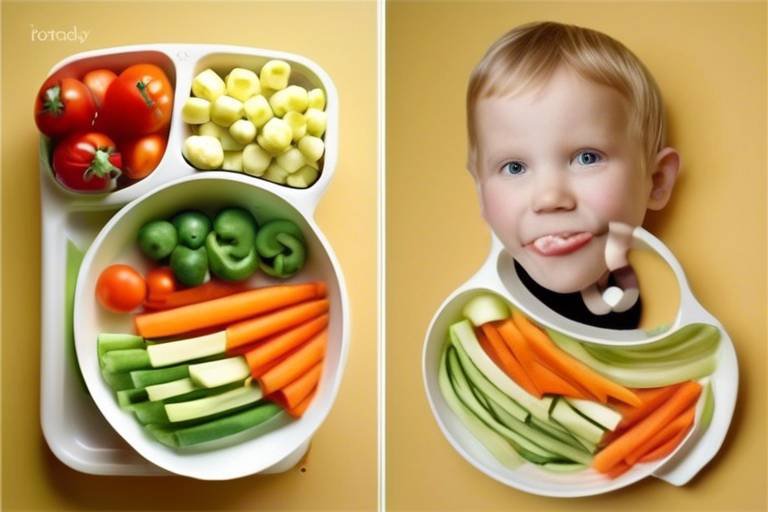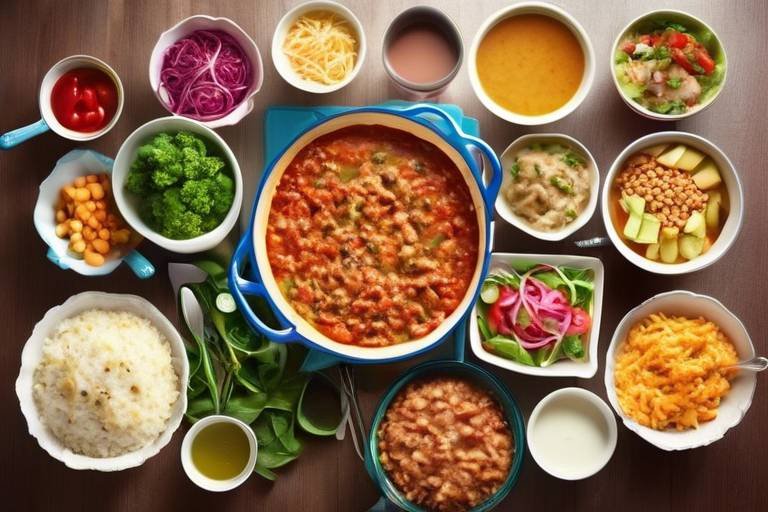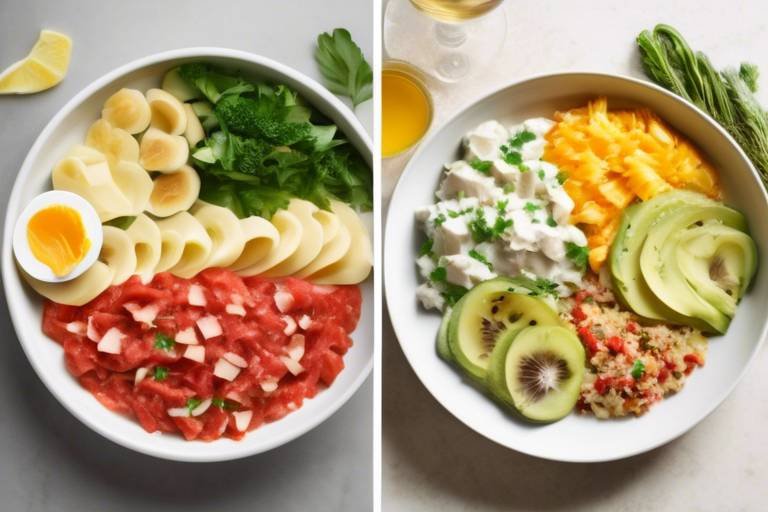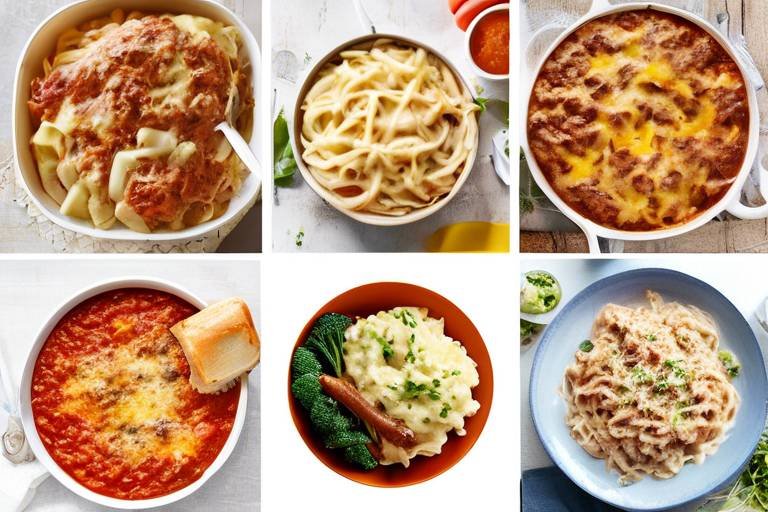How to Boost Your Kids’ Immunity with Nutrition
In today's world, where children are constantly exposed to various germs and viruses, ensuring they have a robust immune system is more crucial than ever. A strong immune system acts like a shield, protecting them from illnesses and allowing them to thrive. But how can we, as parents, help bolster this natural defense? The answer lies in nutrition. By focusing on the right foods and nutrients, we can significantly enhance our kids' immune responses, making them less susceptible to colds, flu, and other infections.
Nutrition is not just about filling their plates; it’s about choosing the right ingredients that nourish their bodies and strengthen their defenses. Imagine their immune system as a fortress, and the foods they consume are the building blocks that fortify its walls. When we prioritize a diet rich in essential vitamins and minerals, we empower our children to combat illnesses effectively. So, what are these magical nutrients, and how can we incorporate them into our children's diets in a fun and engaging way? Let's dive in!
The immune system is a complex network of cells, tissues, and organs that work together to defend the body against harmful invaders. In children, this system is still developing, which makes them more vulnerable to infections. The good news is that nutrition plays a pivotal role in how well their immune system functions. Just like a car needs fuel to run smoothly, our kids need the right nutrients to keep their immune systems in top shape. When they consume a balanced diet, they provide their bodies with the tools necessary to fight off illnesses and recover more quickly when they do get sick.
When we talk about boosting immunity through nutrition, several key players come to mind. These include vitamins and minerals that are essential for the immune system to operate effectively. Among these, Vitamin C, Vitamin D, zinc, and probiotics stand out. Each of these nutrients has a unique role in enhancing immune function, and incorporating them into your child's diet can be both easy and enjoyable.
Vitamin C is often hailed as the superhero of the immune system. It helps in producing antibodies, which are crucial for fighting infections. Think of Vitamin C as the sidekick that arms the immune system with the weapons it needs to fend off invaders. Fortunately, it's easy to add this vitamin to your child's meals. Fruits and vegetables like oranges, strawberries, and broccoli are not only delicious but also packed with Vitamin C. Encouraging your kids to snack on these colorful foods can be a fun way to boost their immune health.
Here’s a quick look at some of the best sources of Vitamin C that you can incorporate into your kids' diets:
- Citrus Fruits: Oranges, lemons, and grapefruits
- Strawberries: A sweet treat that’s also nutritious
- Bell Peppers: Crunchy and colorful, perfect for snacking
- Kiwi: A small fruit with a big punch of Vitamin C
While it's best to get nutrients from food, sometimes supplements can help, especially during cold and flu season. However, it's essential to consult with a healthcare provider before giving your child any supplements. They can guide you on the appropriate dosage and whether it's necessary based on your child's diet and health status.
Zinc is another critical nutrient for children's immune health. It plays a vital role in the development and function of immune cells. Think of zinc as the builder that constructs the immune system's defenses. Studies have shown that adequate zinc levels can reduce the duration of illnesses, helping your child bounce back faster when they do fall ill. Foods rich in zinc include meat, shellfish, legumes, seeds, and nuts, which can easily be incorporated into meals.
Creating a balanced diet is essential for supporting your child's immune system. A diet rich in whole foods—like fruits, vegetables, whole grains, and lean proteins—provides the necessary nutrients for optimal immune function. Imagine their plate as a canvas, where you can paint a colorful array of healthy foods that not only look good but also taste great. When children enjoy their meals, they are more likely to eat healthily, paving the way for better health.
Meal planning can seem daunting, but it doesn't have to be! Here are a few tips to make it easier:
- Involve your kids in the planning process. Let them choose a fruit or vegetable for the week.
- Prep meals in advance, so you have healthy options ready to go.
- Experiment with new recipes that incorporate immune-boosting ingredients.
To foster healthy eating habits, make nutritious foods appealing. You can create fun shapes with fruits and veggies or involve your kids in cooking. When they feel a sense of ownership over their meals, they're more likely to enjoy them. Additionally, try to reduce the availability of processed snacks at home, replacing them with healthier options. Remember, it’s about balance and making healthy choices fun!
Q: How can I encourage my child to eat more fruits and vegetables?
A: Get creative! Try making smoothies, fruit salads, or colorful veggie platters. Involve them in the kitchen, and let them help with preparation.
Q: Are there any specific foods that can boost immunity?
A: Yes! Foods rich in Vitamin C, zinc, and probiotics, like yogurt, are excellent for immunity. Incorporate a variety of these foods into your child's diet.
Q: Should I consider supplements for my child?
A: While whole foods are the best source of nutrients, supplements can be beneficial in certain situations. Always consult a healthcare professional before starting any supplements.

Understanding Immunity
The immune system is like a superhero squad that protects our kids from the bad guys—viruses, bacteria, and other nasty invaders. Think of it as a complex network of cells, tissues, and organs working together to keep your child healthy. When everything is functioning smoothly, the immune system can identify and attack harmful pathogens, ensuring that your little ones stay active and full of life. But did you know that nutrition plays a critical role in how well this superhero squad performs? Just like a car needs fuel to run efficiently, our children's immune systems need the right nutrients to function optimally.
Nutrition directly influences the strength and effectiveness of the immune response. For instance, when kids consume a variety of vitamins and minerals, their bodies produce antibodies—these are the soldiers that fight off infections. On the flip side, a poor diet can leave them vulnerable to illnesses, making it crucial to focus on what goes onto their plates. So, what exactly does it take to boost their immunity?
Essential nutrients, including vitamins A, C, D, and minerals like zinc, play significant roles in immune function. For example, Vitamin C is known for its ability to enhance the production of white blood cells, which are vital for fighting infections. Zinc, on the other hand, helps in the development and function of immune cells. Without these nutrients, the immune system may struggle to fend off even the most common colds.
It’s important to remember that immunity is not just about avoiding illness; it’s about promoting overall health and well-being. A strong immune system can lead to better growth, improved mood, and a more active lifestyle. So, how can we ensure that our kids are getting the nutrients they need? A balanced diet rich in whole foods, including fruits, vegetables, whole grains, and lean proteins, is essential. These foods not only provide the necessary vitamins and minerals but also offer other health benefits, such as fiber and antioxidants.
In summary, understanding immunity is the first step toward boosting your children's health. By focusing on nutrition, you can empower their immune systems to work at their best. The next sections will delve deeper into the specific nutrients that can help bolster this vital system, so stay tuned!
- What foods are best for boosting immunity in children? Foods rich in vitamins and minerals, such as fruits, vegetables, nuts, seeds, and lean proteins, are excellent for enhancing immunity.
- How can I encourage my child to eat healthier? Get creative with meals, involve them in cooking, and make nutritious foods fun and appealing.
- Are supplements necessary for children's immunity? While a balanced diet is ideal, supplements can be beneficial in some cases, especially if dietary intake is insufficient.

Essential Nutrients for Immunity
When it comes to boosting your child's immunity, nutrition plays a pivotal role. It’s like giving their immune system a superhero cape! Certain essential nutrients are the building blocks that help children fend off infections and illnesses. Think of these nutrients as the secret weapons in a warrior’s arsenal, ready to protect against the invading germs. Among the most important are Vitamin C, Vitamin D, zinc, and probiotics. Each of these nutrients contributes uniquely to immune function, and understanding their roles can help you make informed dietary choices for your little ones.
First up is Vitamin C. This vitamin is often celebrated as a champion of immune health. It helps in the production of antibodies, which are like tiny soldiers that fight off infections. When your kids catch a cold, Vitamin C is there to help reduce the severity and duration of their symptoms. Incorporating fruits and vegetables rich in Vitamin C into their meals is a delicious way to ensure they get enough. Think of vibrant oranges, juicy strawberries, and crunchy bell peppers as tasty shields for their immune systems!
But wait, there’s more! Vitamin C also plays a role in enhancing the activity of white blood cells, which are crucial for combating pathogens. So, when you think of Vitamin C, think of it as a booster shot for your child’s immune system. It's not just about preventing colds; it’s about empowering their bodies to fight off anything that comes their way.
Now, let’s talk about where you can find this superhero nutrient. The best dietary sources of Vitamin C include:
- Citrus fruits like oranges and grapefruits
- Strawberries and kiwi
- Bell peppers and broccoli
- Tomatoes and spinach
By including a variety of these foods in your child's diet, you can ensure they receive adequate amounts of Vitamin C without them even realizing it!
While it’s always best to get nutrients from food, sometimes life gets busy, and that’s where Vitamin C supplements come into play. During cold and flu season, these supplements can be a helpful addition to your child’s routine. However, it’s essential to consult with a pediatrician before introducing any supplements to ensure they’re appropriate for your child’s age and health needs.
Next on the list of immune-boosting nutrients is zinc. This mineral is vital for the development and function of immune cells. Think of zinc as the unsung hero in your child's immune system. It helps reduce the duration of illnesses and plays a role in wound healing. Without enough zinc, your child’s immune response can be sluggish, making them more susceptible to infections.
So, how can you ensure your child is getting enough zinc? Foods like meat, shellfish, legumes, nuts, and whole grains are excellent sources. By incorporating these foods into your meals, you can help fortify your child’s immune defenses. Just as a knight needs armor, your child’s body needs zinc to shield itself from illness!
And let's not forget about probiotics. These friendly bacteria are essential for gut health, which is closely linked to the immune system. A healthy gut can enhance the body's immune response, making it crucial for your child's overall health. Probiotics can be found in yogurt, kefir, and fermented foods, making them an easy addition to your child's diet.
In summary, ensuring that your child receives these essential nutrients—Vitamin C, zinc, and probiotics—can significantly boost their immunity. By focusing on a balanced diet rich in whole foods, you can help them build a strong defense against illnesses and infections. After all, a healthy child is a happy child!

The Role of Vitamin C
Vitamin C, also known as ascorbic acid, is often hailed as a superhero nutrient when it comes to boosting immunity. But what makes it so vital for our children? To put it simply, Vitamin C is essential for the production of antibodies, which are the body's defense mechanisms against pathogens. Imagine your child's immune system as a fortress; Vitamin C helps build the walls and fortify the gates, ensuring that harmful invaders like viruses and bacteria have a harder time breaching the defenses.
One of the fascinating aspects of Vitamin C is its role in supporting the function of various immune cells, including lymphocytes and phagocytes. These cells are crucial for identifying and eliminating threats to the body. When your child is armed with adequate Vitamin C, their immune system is like a well-trained army, ready to spring into action at the first sign of trouble. Moreover, Vitamin C is a powerful antioxidant, which means it helps combat oxidative stress in the body. This is particularly important for children, whose bodies are still developing and need all the support they can get to fend off illnesses.
So, how can you ensure that your little ones are getting enough Vitamin C? The good news is that incorporating Vitamin C-rich foods into their diets can be both fun and delicious. Think of colorful fruits and vegetables that can easily brighten up any meal. Some fantastic sources include:
- Citrus Fruits: Oranges, grapefruits, and lemons are packed with Vitamin C and can be enjoyed as snacks or in juices.
- Strawberries: These sweet treats are not only tasty but also loaded with Vitamin C, making them perfect for smoothies or desserts.
- Bell Peppers: Surprisingly high in Vitamin C, bell peppers can be added to salads, stir-fries, or eaten raw with hummus.
By regularly including these foods in your child's diet, you're not just adding flavor but also enhancing their overall health. However, during cold and flu season, you might wonder if Vitamin C supplements are beneficial. While whole food sources are always the best option, supplements can provide an additional boost when needed. Just remember to consult with a healthcare professional before introducing any new supplements to your child's routine.
In conclusion, Vitamin C is a crucial player in strengthening your child's immune system. By making it a regular part of their diet, you’re not only helping them fight off colds and infections but also setting the stage for a healthier future. So, why not get creative in the kitchen and whip up some delicious, Vitamin C-packed meals? Your child's immune system will thank you!
1. How much Vitamin C do children need?
The recommended daily allowance (RDA) of Vitamin C varies by age. Generally, children aged 1-3 need about 15 mg, while those aged 4-8 need 25 mg. Older children may require more, so it's essential to consult with a pediatrician for specific needs.
2. Can Vitamin C prevent colds?
While Vitamin C cannot prevent colds outright, it may help reduce the duration and severity of symptoms. A well-balanced diet rich in Vitamin C can support overall immune health.
3. Are there any side effects of too much Vitamin C?
Excessive Vitamin C intake from supplements can lead to gastrointestinal issues, such as diarrhea. It's best to obtain Vitamin C from foods rather than supplements unless advised by a healthcare provider.

Sources of Vitamin C
When it comes to boosting your kids' immunity, Vitamin C is like the superhero of nutrients! This powerful vitamin plays a pivotal role in supporting the immune system, and the good news is that it can be found in a variety of delicious foods that your children will love. But what are the best sources of Vitamin C? Let’s dive into some tasty options that you can easily incorporate into your family's meals.
First off, citrus fruits are probably the most well-known sources of Vitamin C. Think oranges, lemons, limes, and grapefruits. Not only are these fruits refreshing, but they are also packed with Vitamin C. A single medium orange can provide about 70 mg of Vitamin C, which is more than enough for your child's daily needs!
Next up, we have berries. Strawberries, blueberries, and raspberries are not only delicious but also rich in Vitamin C. For instance, just one cup of sliced strawberries contains about 98 mg of Vitamin C. You can toss them into yogurt, blend them into smoothies, or simply serve them as a sweet snack.
Don't forget about bell peppers! These colorful veggies are a fantastic source of Vitamin C, with a single medium red bell pepper packing around 152 mg. They can be eaten raw in salads, roasted, or even stuffed for a fun and nutritious meal. Plus, their vibrant colors can make any dish more appealing to kids.
Other great sources include kiwis, which are not only tangy but also provide around 71 mg of Vitamin C per medium fruit. You can slice them up for a snack or add them to fruit salads. Broccoli is another excellent choice; it contains about 81 mg of Vitamin C per cup when cooked. Steamed broccoli can be a tasty side dish that complements any meal.
Here’s a quick summary of some of the top sources of Vitamin C:
| Food Source | Vitamin C Content (mg per serving) |
|---|---|
| Orange (1 medium) | 70 mg |
| Strawberries (1 cup, sliced) | 98 mg |
| Red Bell Pepper (1 medium) | 152 mg |
| Kiwi (1 medium) | 71 mg |
| Broccoli (1 cup, cooked) | 81 mg |
Incorporating these Vitamin C-rich foods into your children's diet can be both fun and easy. Whether it's a refreshing fruit salad, a colorful stir-fry, or a simple snack of sliced peppers, there are endless possibilities to keep your kids healthy and happy. So, the next time you're at the grocery store, make sure to load up on these vibrant and nutritious foods!

Vitamin C Supplements
When it comes to bolstering your child's immune system, can be a hot topic among parents. While a well-rounded diet rich in fruits and vegetables is the best way to ensure your kids get enough of this essential nutrient, sometimes life gets in the way. Busy schedules, picky eaters, and food allergies can make it challenging to consistently provide the right foods. This is where supplements can step in as a helpful ally.
Vitamin C is known for its role in supporting the immune system by promoting the production of antibodies and enhancing the function of immune cells. During cold and flu season, many parents consider giving their children Vitamin C supplements to help fend off illnesses. But before you rush to the store, it's important to understand both the potential benefits and the considerations involved.
One of the primary advantages of Vitamin C supplements is their convenience. They come in various forms, such as chewable tablets, gummies, and powders, making them appealing to children. This variety can make it easier to encourage your kids to take their vitamins, especially if they are reluctant to eat their fruits and veggies. Additionally, studies have shown that Vitamin C can reduce the duration and severity of colds, which is a significant benefit for kids who seem to catch every bug that goes around.
However, it’s essential to approach supplementation with caution. Overconsumption of Vitamin C can lead to side effects such as stomach upset and diarrhea. Therefore, it’s crucial to adhere to the recommended daily allowances for children, which vary by age:
| Age Group | Recommended Daily Allowance (RDA) |
|---|---|
| 1-3 years | 15 mg |
| 4-8 years | 25 mg |
| 9-13 years | 45 mg |
| 14-18 years | 65-75 mg |
Before introducing any supplements, it's a good idea to consult with your pediatrician, especially if your child has any existing health conditions or is taking other medications. Your healthcare provider can help determine if supplementation is necessary and recommend the best form and dosage for your child.
In conclusion, while Vitamin C supplements can be a valuable addition to your child's health regimen, they should not replace a balanced diet. Encouraging your kids to eat a variety of colorful fruits and vegetables will not only provide them with Vitamin C but also a host of other vital nutrients that work together to support their overall health. So, while a supplement can be a useful tool, remember that the foundation of a strong immune system lies in a nutritious diet.
- Can children take too much Vitamin C? Yes, excessive Vitamin C can cause gastrointestinal issues. Always follow recommended dosages.
- Are there natural food sources of Vitamin C? Absolutely! Citrus fruits, strawberries, kiwi, bell peppers, and broccoli are all excellent sources.
- When should I consider giving my child Vitamin C supplements? If your child is a picky eater or during cold and flu season, supplements may be beneficial, but consult with a doctor first.

The Importance of Zinc
Zinc is one of those unsung heroes when it comes to boosting your child's immune system. Imagine it as a vital support team, working tirelessly behind the scenes to keep the immune cells functioning optimally. This essential mineral plays a crucial role in the development and function of immune cells, particularly T-cells, which are pivotal in defending the body against pathogens. When your child gets sick, zinc steps up to the plate, helping to reduce the duration and severity of illnesses like the common cold. It’s like having a secret weapon in their nutritional arsenal!
But how does zinc work its magic? Well, it’s involved in a myriad of biological processes, including cell division and the production of proteins that are essential for immune responses. Think of zinc as the glue that holds everything together; without it, the immune system can become less effective, leaving your little ones vulnerable to infections. This is particularly important for growing children, as their bodies are constantly developing and need adequate zinc levels to support their growth and immune health.
So, where can you find this crucial mineral? Zinc is abundant in various foods, making it easier than ever to include it in your child's diet. Here are some excellent sources:
- Red meat and poultry
- Seafood, especially oysters, which are the richest source
- Beans and legumes
- Nuts and seeds
- Whole grains
While it's fantastic to know where to find zinc, it's equally important to understand how much your child needs. The recommended dietary allowance (RDA) varies by age, so it's essential to tailor their zinc intake accordingly. For instance, children aged 1-3 years need about 3 mg per day, while those aged 4-8 years require 5 mg. As they grow older, their needs increase, making it vital to monitor their dietary sources.
However, it’s worth noting that too much zinc can lead to adverse effects, such as nausea and headaches. So, while encouraging your kids to eat zinc-rich foods, it’s also crucial to ensure they are not over-consuming zinc supplements unless advised by a healthcare professional. Balancing their intake is key!
In summary, zinc is indispensable for your child's immune health. By including zinc-rich foods in their diet, you can help fortify their immune system, ensuring they are better equipped to fend off illnesses. It’s like giving them a shield against the germs lurking around every corner. So, the next time you're planning meals, think about how you can incorporate this powerhouse mineral into their plates!

Balanced Diet for Strong Immunity
When it comes to boosting your kids' immunity, a balanced diet is your best ally. Think of their bodies as a fortress; the stronger the walls, the better they can defend against invaders like colds and flu. But what does a balanced diet look like? It's not just about avoiding junk food; it’s about filling their plates with a variety of whole foods that provide the nutrients their growing bodies need. A diet rich in fruits, vegetables, whole grains, and lean proteins serves as the foundation for a robust immune system.
Imagine each meal as an opportunity to fuel their immune system. For instance, colorful fruits and vegetables are packed with antioxidants and vitamins that help fight off infections. Whole grains provide essential fiber, which supports gut health—a key player in immune function. Lean proteins, like chicken, fish, beans, and nuts, help build and repair tissues, including those vital immune cells. So, how do you ensure your little ones are getting all these nutrients? It’s all about variety and creativity in meal planning.
To make things easier, here are some meal planning tips to incorporate immune-boosting foods into your children’s diets without sacrificing flavor:
- Include a rainbow of fruits and vegetables at every meal. The more colors, the more nutrients!
- Try to incorporate whole grains like quinoa, brown rice, and whole wheat pasta instead of refined grains.
- Experiment with different cooking methods—roasting, grilling, or steaming can enhance the taste of vegetables.
- Involve your kids in the cooking process. When they help prepare meals, they’re more likely to eat what they’ve made.
But it’s not just about what’s on their plates; it’s also about fostering healthy eating habits. Kids are naturally curious, and this curiosity can be a powerful tool. Encourage them to explore new foods by making it a fun adventure. You can create a “food passport” where they get to try foods from different cultures, or have themed dinner nights where you prepare dishes from around the world. The goal is to make nutritious foods appealing and enjoyable, steering them away from processed snacks that offer little nutritional value.
In addition, setting a good example is crucial. If they see you enjoying a variety of healthy foods, they're more likely to emulate those choices. Remember, the journey to a healthier diet is a marathon, not a sprint. Gradually introducing changes can lead to lasting habits. So, let’s roll up our sleeves and get cooking—because a strong immune system starts with what’s on the table!
Q: How can I make healthy foods more appealing to my kids?
A: Get creative! Use fun shapes, vibrant colors, and involve them in the cooking process. Making meals interactive can pique their interest.
Q: Are there specific foods I should avoid for my kids’ immunity?
A: While it’s okay to indulge occasionally, try to limit processed foods high in sugar and unhealthy fats, as they can weaken the immune system.
Q: How often should my kids eat fruits and vegetables?
A: Aim for at least five servings of fruits and vegetables each day. The more variety, the better!
Q: Can supplements replace a balanced diet?
A: Supplements can help, but they should not replace whole foods. A balanced diet provides a range of nutrients that work together to support health.

Meal Planning Tips
When it comes to boosting your kids' immunity, meal planning is like having a secret weapon in your back pocket. It's not just about filling their plates; it's about making sure those plates are loaded with nutrient-dense foods that support their health. Start by involving your children in the meal planning process. This can make them more excited about trying new foods and understanding the importance of nutrition. You might say, “Hey, what do you think about adding some colorful veggies to our meals this week?” This simple question can spark their interest and make them feel included.
Next, consider creating a weekly meal plan that includes a variety of food groups. Aim for a rainbow of fruits and vegetables, whole grains, lean proteins, and healthy fats. For instance, you could plan a dinner that features grilled chicken, quinoa, and a vibrant salad with cherry tomatoes, spinach, and avocado. Not only does this look appealing, but it also ensures that your kids are getting a balanced meal. Remember, variety is key! The more diverse their diet, the more likely they are to receive all the essential vitamins and minerals their bodies need.
Another tip is to prepare meals in batches. This can save you time during the week and ensure that you always have healthy options on hand. For example, cook a large pot of vegetable soup or chili on the weekend and portion it out for quick lunches or dinners. You can even freeze some portions for those particularly busy days. When your kids are hungry and looking for a snack, having healthy options readily available can prevent them from reaching for processed snacks. Consider keeping a stash of cut-up fruits, yogurt, or whole-grain crackers in the fridge for easy access.
Don’t forget about incorporating fun into your meal prep! Kids love hands-on activities, so why not make it a family event? You could set aside a day to make homemade pizza with whole-wheat crusts, where everyone can choose their own toppings. This not only teaches them about nutrition but also creates lasting memories. Plus, when they’ve had a hand in making the meal, they’re more likely to eat it!
Lastly, keep an eye on portion sizes. It’s easy for kids to get overwhelmed by large servings. Instead, serve smaller portions and allow them to ask for seconds if they’re still hungry. This helps them learn to listen to their bodies and understand when they’re full, promoting a healthy relationship with food.
In summary, meal planning is not just about convenience; it’s about creating an environment where healthy eating becomes second nature for your kids. By involving them in the process, ensuring variety, preparing in advance, making it fun, and being mindful of portions, you’re setting them up for a lifetime of healthy habits that support their immune systems.
- How can I make vegetables more appealing to my kids? Try incorporating them into smoothies, using fun shapes, or letting them dip veggies in hummus or yogurt-based dressings.
- What are some quick immune-boosting snacks? Yogurt with fruit, mixed nuts, or whole-grain toast with avocado are all great options!
- How often should I introduce new foods to my children? It can take several exposures for a child to accept a new food, so try introducing it multiple times in different ways.

Encouraging Healthy Eating Habits
This article explores effective nutritional strategies to enhance children's immune systems, focusing on essential vitamins, minerals, and dietary habits that can support their health and well-being.
Learn about the immune system's role in children's health and how nutrition directly influences its effectiveness in fighting off illnesses and infections.
Discover key vitamins and minerals that play a crucial role in boosting children's immune responses, including Vitamin C, Vitamin D, zinc, and probiotics.
Explore how Vitamin C contributes to immune function, helps in the production of antibodies, and can be easily incorporated into children's diets through fruits and vegetables.
Identify the best dietary sources of Vitamin C, such as citrus fruits, strawberries, and bell peppers, to ensure your kids receive adequate amounts.
Discuss the potential benefits and considerations of using Vitamin C supplements for children, especially during cold and flu season.
Understand how zinc supports immune cell function and reduces the duration of illnesses, making it essential for children’s overall health.
Learn the importance of a balanced diet rich in whole foods, including fruits, vegetables, whole grains, and lean proteins, to support children's immune systems effectively.
Get practical meal planning tips to incorporate immune-boosting foods into your children's daily diets without compromising on taste or variety.
Encouraging healthy eating habits in children is like planting a seed; it takes time, patience, and the right environment to grow into something beautiful. One of the most effective ways to instill these habits is by making nutritious foods appealing. Start by involving your kids in meal preparation. When children help in the kitchen, they become more interested in what they eat. You can have fun by letting them choose between different fruits and vegetables, or even allowing them to create their own healthy snacks. This not only fosters a sense of independence but also empowers them to make better food choices.
Another effective strategy is to create a colorful plate. Kids are naturally drawn to vibrant colors, and a plate filled with a variety of fruits and vegetables can be much more enticing than a bland meal. Think of it as an artist’s palette; the more colors you have, the more appealing the dish looks. Additionally, consider setting a good example. Children often mimic their parents' behavior, so if they see you enjoying healthy foods, they are more likely to follow suit. Make family meals a time for connection, where everyone shares their day and enjoys wholesome foods together.
Moreover, it's crucial to limit the availability of processed snacks at home. Instead, stock up on healthy alternatives. For instance, instead of chips, offer air-popped popcorn or veggie sticks with hummus. You can also make healthy snacks fun by creating a “snack station” where kids can choose from various healthy options. This not only gives them a sense of control but also encourages them to explore different tastes and textures.
Lastly, celebrate small victories. If your child tries a new vegetable or chooses fruit over candy, acknowledge their efforts. Positive reinforcement can go a long way in building their confidence and encouraging them to continue making healthy choices. Remember, it’s all about creating a supportive environment where healthy eating becomes a natural part of life.
- What are some easy ways to introduce more fruits and vegetables into my child's diet? You can blend fruits into smoothies, add vegetables to pasta sauces, or create fun fruit salads.
- How can I make healthy snacks more appealing to kids? Try presenting snacks in fun shapes, using colorful plates, or involving them in the preparation.
- What are some signs that my child’s immune system might need support? Frequent colds, fatigue, and slow recovery from illnesses can be indicators that their immune system needs a boost.
Frequently Asked Questions
- What are the best foods to boost my child's immunity?
To help your child’s immune system thrive, focus on a variety of whole foods. Incorporate fruits like oranges and strawberries, vegetables such as bell peppers and broccoli, whole grains like oats and brown rice, and lean proteins including chicken and fish. These foods are packed with essential vitamins and minerals that support immune health.
- How does Vitamin C help my child's immune system?
Vitamin C is a powerhouse when it comes to immunity! It aids in the production of antibodies, which are crucial for fighting off infections. Plus, it’s an antioxidant that helps protect cells from damage. Regularly including Vitamin C-rich foods in your child's diet can significantly enhance their immune response.
- Is it necessary to give my child Vitamin C supplements?
While it’s best to get nutrients from food, supplements can be beneficial during cold and flu season or if your child is a picky eater. However, always consult with a healthcare professional before starting any supplements to ensure they are necessary and safe.
- What role does zinc play in boosting immunity?
Zinc is vital for the development and function of immune cells. It helps reduce the duration of illnesses and supports the body’s ability to fight infections. Foods rich in zinc, like meat, shellfish, beans, and nuts, should be part of your child's diet for optimal immune function.
- How can I encourage my child to eat healthier?
Making healthy foods fun and engaging is key! Involve your kids in meal planning and preparation, and try to present fruits and vegetables in creative ways. You can also set a good example by maintaining a healthy diet yourself. Remember, a little creativity goes a long way!
- What are some meal planning tips for incorporating immune-boosting foods?
Plan meals around seasonal fruits and veggies to keep things fresh and exciting. Batch cooking and prepping snacks in advance can also help. Try to include at least one immune-boosting food in every meal, and don't hesitate to experiment with new recipes to keep your kids interested!







